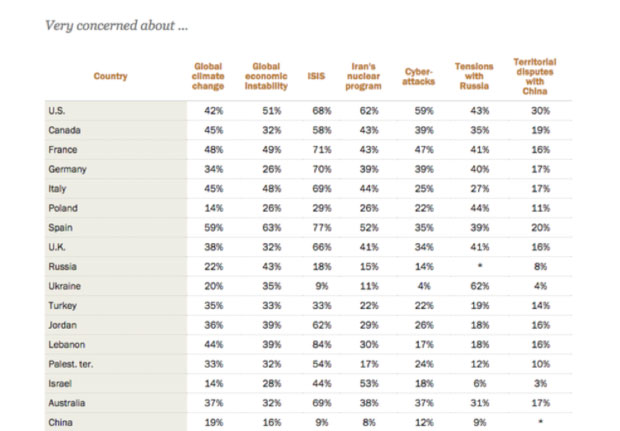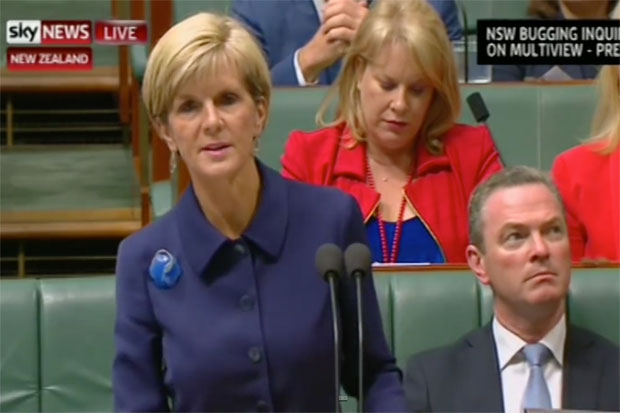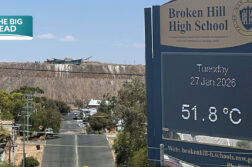Last week, Buzzfeed ran a story on a poll by the Pew Research Centre, with amazing results.
Pew asked respondents in various countries about issues they might be concerned with – climate change, cyber-attacks, global economic instability and so on.
Of the issues surveyed, most Australians weren’t “very concerned” about any of them.
Except ISIS (which I’ll call Daesh, because apparently they’re quite touchy about it). 37 percent of Australians are very concerned about climate change. 38 percent are very concerned about Iran’s nuclear weapons. And 69 percent are very concerned about Daesh.

Reflect for a second on the fact that this level of deep concern about Daesh is insane. The threat of Daesh is negligible, and every Australian who hasn’t lost track of their faculties should be able to recognise this.
That so many don’t is indicative of the success of the ridiculous rhetoric of the Abbott government, which has gotten a pass from our media, which mostly ranges from obedient and ignorant to racist and fear-mongering, and also the ALP so-called opposition.
I’ll take just two examples of government hyping of the threat, though many more could be given.
The first is a video of Tony Abbott. He naturally began by calling Daesh a “death cult”, and then said it’s “coming after us”.
We “may not feel we are at war with them, but they certainly think that they are at war with us.” And then he warned us, “All you need for terrorism these days is a knife, a flag, a camera phone and a victim”.
The point is transparent: the Muslims are out to get us, and any of them can be hiding under our beds: “This is the grim reality that the world faces now”. Which is similar to the grim reality before Daesh – the tiny, remote chance that a deranged stranger might murder you with a knife also existed then.
Another example is our Foreign Affairs Minister Julie Bishop. Previous highlights of her response to Daesh include a warning that it had gathered nuclear material and could now make a large “dirty” bomb.
But let’s take her at her most considered. Bishop gave a major talk about the Middle East and Daesh to the Sydney Institute on April 27. Bishop apparently adopted the view that Daesh poses a more serious risk to the world than nuclear warfare did during the Cold War: “the most significant threat to the global rules based order to emerge in the past 70 years – and included in my considerations is the rise of communism and the Cold War.”
Interestingly, in her speech, Bishop repeatedly refers to the analysis of Iran on the threat of Daesh. This is an interesting development, which I won’t analyse here. Bishop claimed that “Da'esh seeks to drag the world back to the Dark Ages in its preferred form of brutality and violence, crucifixions, beheadings and mass executions.”
She also noted that “Iran's President Rouhani described Da'esh as a cancer that could metastasise across northern and central Africa, Middle East, Afghanistan, Pakistan and into South East Asia.” Supposing that this fanciful scenario was worth taking seriously, note that even Bishop’s wildest claims don’t include any suggestion that Daesh was going to invade Australia.
So what is the threat from Daesh? Bishop explained that “Da’esh is recruiting in our country, reaching into the homes of our citizens, radicalising our young people online. Our present understanding is that around 100 Australian citizens are currently in Iraq and Syria fighting with Da'esh.”
Also, “Our intelligence agencies know of at least 100 Australian citizens in this country now who are actively supporting Da'esh.”

Okay, so 100 Australians halfway around the world aren’t presently posing any danger to Australia. Bishop observed that at least 20 had been killed fighting for Daesh, and 30 had returned to Australia.
Those who fought for Daesh plainly do pose a problem. However, finding a way to deal with them consistent with norms of due process and the rule of law shouldn’t be too hard. The government could simply pass legislation that allowed people to be prosecuted for war crimes committed overseas, and then charge them on this basis.
However, the danger for this type of approach would be that it could be used against Australians who fight with the Israeli army, which neither major party would support.
Alternatively, as Daesh is already designated as a terrorist organisation, these individuals could be tried under that legislation. If the government cannot prove in a court of law that an individual has committed a crime – even supposing we were to grant legitimacy to Australian anti-terrorism laws, which they do not deserve – then it should be straightforward that that individual should not be punished regardless. Even if said individuals personally own knives and cameras.
Bishop then addressed the recruitment methods of Daesh. Whilst some might think they only target “criminals and those with a history of mental illness, drug abuse or poverty”, they “are also preying on young men and women from middle income families who have been well educated and have no background of social isolation or disadvantage or religious extremism.”
That is, “individuals from across the socio-economic spectrum who have lost faith in their lives and see their world as being irredeemably corrupt or unfair.” What might they see as corrupt or unfair? Bishop doesn’t explain. That is the only hint at some kind of grievance that Daesh recruiters might play on.
She goes on that they “appeal to the naïve idealism of youth, who seek a world without compromise.” Okay, and what kind of ideals is it that Daesh might play on? Bishop cites a terrorism expert called Sidney Jones, who “identifies five main motivations behind foreign terrorist fighters joining Da'esh”. These are:
1. A desire to take part in the final battle of the Islamic apocalypse (the battle between infidels and Muslims preceding the Day of Judgement);
2. A desire to help Muslims under attack;
3. A desire to take part in jihad;
4. A desire to benefit from what she calls the "5 star jihad" – for Da'esh is providing fighters and their families with money, accommodation, food, health care, education;
5. A desire to be part of the Caliphate and the great Islamic experiment of living under an ancient interpretation of Sharia law, deemed by followers as "pure".
Putting aside the euphemistic and unexplained premise that Muslims are “under attack” (by who?) suddenly, it’s not the “naïve idealism of youth” that drives Australians to fight for Daesh at all.
They actually leave Australia – with a decent social safety net – for all the benefits of Daesh’s apparent systems of accommodation, education and health care.
Ms Bishop seems to think it’s a plausible explanation that young Australians would go to a dangerous and devastated country, and face the risk of death in a brutal war, so that they can get food and accommodation in Syria or Iraq.
That this kind of vapid nonsense is received seriously tells us something about the knowledge and independence of Australian commentators.
What can we expect from Daesh in Australia? Recall the threat that arose in September last year when it urged its followers to kill Australians: “If you can kill a disbelieving American or European – especially the spiteful and filthy French – or an Australian, or a Canadian, or any other disbeliever from the disbelievers waging war, including the citizens of the countries that entered into a coalition against the Islamic State, then rely upon Allah, and kill him in any manner or way however it may be.”
About 10 months later, the results of this call have, from the perspective of Daesh, been rather meagre. There have been a handful of arrests, such as of two 18-year-olds in April who were allegedly planning a terrorist attack. There was an 18-year-old who allegedly stabbed two police officers, before being shot dead. According to Fairfax, “Victoria Police chief commissioner Ken Lay says he does not believe the death has anything to do with” the Daesh call for supporters to murder Australians.
One incident that has received limited attention was the shooting of a Shia man by a group of men in a car. They allegedly shouted “IS lives forever”, and called the pedestrians and victim “Shia dogs”.
Police, however, “told the ABC there is nothing to suggest the shooting is linked to IS.”
There was the siege in Martin Place by Man Haron Monis. Yet Monis was an incompetent quack, who until shortly before his death self-identified as a senior Shia religious cleric. Australian Shi’ites reportedly dismissed his claims, and even urged the police to investigate him. As sympathetic as he may have become to Daesh, he was unable to even acquire a Daesh flag.
What this motley crew adds up to is roughly what was seen in the excellent British satire, Four Lions. A motley collection of bumbling idiots, social misfits, quacks and teenagers, who pose a negligible threat, which competent police should be able to address like any other criminal threat to society.
As the threat from Daesh essentially will come from its ability to recruit Muslims, the scale of Australian fear of Daesh seems to me a revealing indicator of widespread Australian distrust of Australian Muslims.
The fact is that a tiny fraction of the roughly 500,000 Muslims in Australia support Daesh, whilst the vast majority oppose it with the same gusto as anyone else. The extent of Australian concern indicates a widespread belief that Daesh will find fertile recruiting ground in Australia.
A survey by Essential Research, with a possibly biased question, found that 74 per cent of Australians regarded domestic violence as a greater threat than terrorism. This perception is well grounded in facts – perhaps 43 women have been killed in domestic violence incidents this year alone.
This is a far greater toll than that claimed by Daesh in Australia, and is likely to remain far higher. However, the level of danger has an inverse correlation to public funding.
The federal government’s budget in 2014-5 allocated $28.7 million to the National Plan to Reduce Violence Against Women. Renee Carr from Fair Agenda observed that “inadequate government funding means thousands of women are still being turned away from the services that should be helping keep them safe”. Meanwhile, our re-invasion of Iraq to fight Daesh is projected to cost $500 million per year.
For those interested in how to limit the appeal of Daesh, we might listen to Muslim organisations. For example, the Australian National Imams Council argued that “one of the main causative factors for local radicalisation in the west has been the western governments' military involvement in the Middle East. The support of unjust, dictatorial regimes as well as unilateral military aggression based on duplicitous foreign policy positions has only aggravated the state of global fear and violence.” It should be easy to know what they’re referring to.
If the media were to feature a Muslim now and then, the public might find Muslims less menacing. The public might also learn a bit about Daesh and western foreign policy. The implications of this obviously frighten our political elites, as shown by the reaction to Randa Abdel-Fattah’s appearance on Q&A.
In March this year, I observed that Tony Abbott had responded to his desperate political situation by seeking scapegoats. The evidence suggests that Abbott might have finally changed the subject to an issue on which he has gained some traction.
The cost to Muslims in Australia and social cohesion has been dire. Whilst Abbott’s cruel first budget met effective resistance, the campaign against Muslims has found virtually no opposition.
This tells us something about the legacy the Abbott government will leave, but it also tells us something significant about Australia today.
Donate To New Matilda
New Matilda is a small, independent media outlet. We survive through reader contributions, and never losing a lawsuit. If you got something from this article, giving something back helps us to continue speaking truth to power. Every little bit counts.





